By Claire Holland
The Covid-19 pandemic has changed a lot of things, including working from home, socialising online (I grew up in the 90’s, so MSN Messenger prepared me well for that), and a constant undercurrent of uncertainty and miscommunication. As I sit down to write about starting my new job in the midst of a pandemic, it strikes me that this has been the oddest first week of work of my life.
Gone are the first-day jitters about finding the correct business attire to look both professional and approachable (I have bright purple hair and a nose ring so both can be quite difficult!). And, no need to keep checking the bus routes to the office before finally deciding to get a taxi which gets you there an hour early so you have to anxiously wander around outside. Instead, the ‘new normal’ is putting on a relatively respectable and clean-looking jumper while desperately searching for a desk with a neutral looking background and good WiFi signal for Zoom meetings, with as much privacy as you can manage in a house of other trapped humans/children/animals. Although strange, I was surprised with the ease with which this became normal.
The transition that has been less easy, and is still in progress, is the shift from biochemist to a social science and policy-orientated role at the Manchester Institute of Innovation Research as a Research Associate in the Responsible Research and Innovation (RRI) Group working with the Manchester Synthetic Biology Research Centre. Some of the more obvious differences I was prepared for; a wider breadth of research within the group, more human interaction (albeit via Zoom), more reading, and no lab work (although I have to admit I’m enjoying the improvement in my lungs from not inhaling acetone daily). What I wasn’t expecting was the conflict between the unconscious and deep-seated feeling of autonomy I have from being a research scientist, and my new position. As I learn more about RRI and its role in scientific regulation and development, the logical part of my brain can see the value of it. However, my emotional objections are still hard to overcome.
“So, what is Responsible Research and Innovation (RRI)?” you may ask, because, as a biochemist with 10-years’ experience in the lab… I had no idea.
RRI is not a new idea per se; its predecessors include the relatively well-known ELSA (ethical, legal and social aspects) framework – also known as “the part of a grant proposal that you tend to skip past if your work isn’t human/GMO/biosecurity centric”. However, while ELSA and other mechanisms of ethical governance have typically focussed on the societal impacts of the products of research and innovation – usually after detrimental findings – RRI goes further.
RRI is the idea that everyone involved in research – from scientists to policy makers, businesses, publics, and funders – should work together collaboratively throughout the entire research process – from inception to delivery – to develop transparent and interactive processes to anticipate impacts and deliver products and processes that are viable, and societally useful and accepted.
Why do we need RRI?
The power of technology and science to provide both great benefit and significant harm has become clear over time. Nuclear fission, for example, can be harnessed as an energy source and as the core of an atomic bomb. Science has traditionally been allowed a high degree of autonomy, often with little or no consideration to the regulation or application of new knowledge. As Ian Malcom (Jeff Goldblum) said in Jurassic Park (notably after the dinosaurs had begun running rampage):
“…scientists were so preoccupied with whether or not they could, they didn’t stop to think if they should…”
While science traditionally deals with the ‘could’, RRI makes us consider whether we ‘should’ and the repercussions if we ‘do’, not just morally but socially, economically, politically and environmentally.
But how does this work for research in the ‘real-world’?
Despite media inferences, the vast majority of scientists are not creating advanced bioweapons, synthesising new viruses or ‘playing God’ by attempting to genetically modify monkeys to make them glow in the dark. Previously, my research focussed on making bioplastics from potatoes. What kind of ethical issues could there be?
Under the ELSA framework, probably none. I’ve written a lot of grants (a lot!) and seldom been asked to consider the implications of this kind of work. In fact, more often than not, an ethical evaluation wasn’t even a requirement of my application.
However, the picture becomes more complex when you apply the RRI approach of anticipation, reflexivity, inclusion and responsiveness.
It’s not just about considering whether it is morally correct to use a potato to make a plastic (that would be a tad ridiculous) but also foreseeing the impact of the research and those that it affects. If I use agricultural off-shoots for my work am I depriving anyone else of these resources? How does this affect the farmers that produce the waste? If this was to be upscaled to industrial standards have I produced a plastic suitable for upscaling? Has this upscaling compromised the integrity of the plastic? Are facilities available for upscaling? What will be public perceptions of the plastic? Is anyone losing jobs because of this? Is it truly sustainable?
RRI prompts us to ask such questions and determine contingency plans from the offset to avoid or mitigate issues if they arise, rather than fixing them, if possible, after the fact.
Although I see many advantages in the RRI framework, as a scientist I still have concerns
A core notion of RRI is that societal challenges should be a primary focus of scientific research, and there is a strong drive for the production of socially-beneficial outputs.
However, we cannot run before we can walk. Fundamental research, which is neither instantly marketable nor obviously socially relevant, is an absolute requirement for the long-term integrity and development of science. In the field of plant cell wall biology, for example, the accepted cell wall structure paradigm has come under significant criticism over recent years but research into determining the real structure is chronically underfunded. Further fundamental research is needed to fully appreciate the best prospects for innovation in this domain.
Looking forward
The COVID-19 pandemic offers an unprecedented opportunity to pause and consider how we do things within the research community – to reflect on what is and isn’t working rather than continuing to push forward with the status quo.
A large problem in scientific research is a need to keep up momentum in order to produce desired results before short contracts are concluded. This doesn’t necessarily afford researchers with the ability to look up from the bench and consider the broader implications or indeed direction of their work. This is something that needs to be considered at the first instance, during project conception, so that when deadlines are approaching and the pressure is on, the ethics or implications aren’t an insurmountable consideration that can be ignored in the name of time.
Considering RRI from the offset, as early as at project conception and grant writing stages, allows for constant monitoring and flexibility (with little additional time consumption) but while still ensuring the work remains scientifically and socially relevant.
While working entirely from home will be temporary, RRI should become an integrated part of our new normal. If done sincerely, through concerted action across a wide range of actors, RRI could play a critical role in the evolution of a robust research framework that is not just fit for purpose, but is sufficiently sustainable, flexible and intuitive for the post-pandemic future.
 Claire Holland is a Research Associate at the Manchester Institute of Innovation Research in the Responsible Research and Innovation Group working with the Manchester Synthetic Biology Research Centre (SYNBIOCHEM). She has a PhD in Biochemistry.
Claire Holland is a Research Associate at the Manchester Institute of Innovation Research in the Responsible Research and Innovation Group working with the Manchester Synthetic Biology Research Centre (SYNBIOCHEM). She has a PhD in Biochemistry.
This blog was originally published on 13 August 2020 by the Manchester Institute of Innovation Research.

